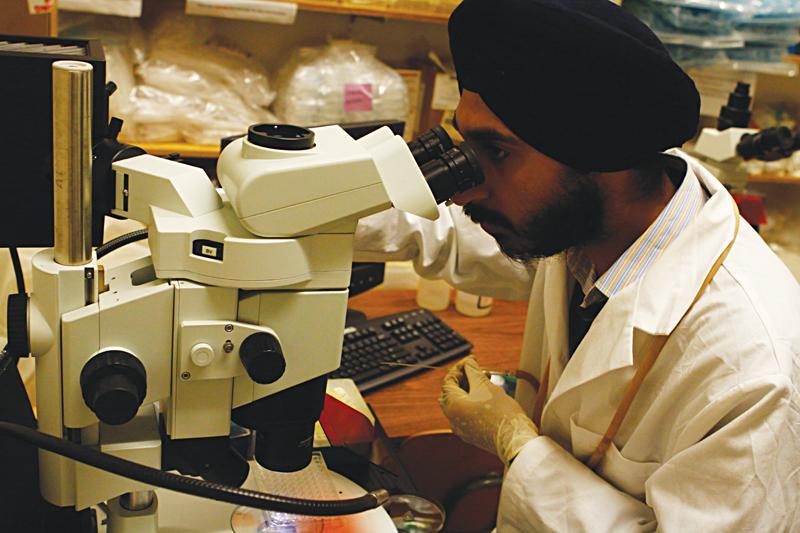News release previously published by Fresno State News.
A $1 million gift from a donor who wishes to remain anonymous will fund two areas at Fresno State: student research in genetics and molecular biology and The President’s Circle for Excellence, University President Joseph I. Castro announced today.
With several community dignitaries and faculty present in the courtyard of the University’s Science II Building, the president also formally introduced the new dean of the College of Science and Mathematics,Dr. Christopher Meyer, who began his new role July 20.
Castro said that $500,000 of the gift will fund undergraduate, team-based research in biology or chemistry that features experiences for students in genetics and molecular biology in the college.
The other half of the donation is for The President’s Circle for Excellence, an existing fund maintained by the Fresno State Foundation for private gifts to be distributed at the discretion of the University president to meet smaller program needs on campus.
Examples of President’s Circle programs include the DiscoverE student tablet initiative, the Student Cupboard, the Good Samaritan Fund and scholarships.
Castro expressed gratitude for the donor’s generosity to help strengthen the University’s mission and fuel student success.
“By elevating academic experiences and supporting undergraduate research we are opening new opportunities for our students to grow into the next generation of medical professionals and scientists and to be more prepared for the job market after graduation and beyond,” Castro said.“On behalf of our students, faculty and staff, I’d like to express our deep gratitude to this visionary donor. This investment aligns with Fresno State’s strategic direction to enhance teaching and learning opportunities for our students and to remove barriers towards achieving the dream of a higher education. This act of kindness and compassion for our students is inspiring.”
At the event, Meyer said the science and math portion of the gift will support the incorporation of authentic and cutting-edge interdisciplinary research into chemistry and biology laboratory courses, centering on modern genetics, molecular biology and biotechnology.
“The ‘learn by doing’ approach in Course-based Undergraduate Research Experiences (CUREs) has been shown to enhance student technical, critical thinking and communication skills that are critical for the 21st century workforce,” Meyer said. “This gift will allow for many more students to participate in the high-impact practice of research, providing more opportunities for students to present their research at regional and national meetings and publish with faculty mentors.”
This underscores theCollege of Science and Mathematics’ primary goal, he said: “to graduate the next generation of scientists and mathematicians, teachers, technicians, health professionals and field researchers.”
He said this force of scholars “will contribute solutions to real-world, complex and interdisciplinary challenges the Central Valley and our society faces with respect to food, energy, water, human health and the environment.”
The college and itsseven academic departments”” biology, chemistry, computer science, earth and environmental sciences, mathematics, physics and psychology ”” serve students seeking future careers in science and technology.
The College of Science and Mathematics’ “rigorous and engaging curriculum and programs” are designed to best prepare students for success in graduate education and health professions training as well as for a variety of career options that include industry, K-12 teaching, clinical practice, government and higher education, Meyer said.
Some previous college projects include groundbreaking research that played a key role in developing a new approach to understanding the role of environmental toxins in ALS and Alzheimer’s disease and a program that researched the correlation between pesticides and breast cancer among Latina farm workers.
Meyer also announced that renovated biology and chemistry labs will open Oct. 30.
Prior to taking over as dean, Meyer was a program director in the Division of Biological Infrastructure at the National Science Foundation in Arlington, Virginia. He earned a bachelor’s degree in chemistry from California State University, Chico in 1985 followed by his Ph.D. in biochemistry from the University of California, Riverside in 1990. The biochemist served as a postdoctoral scholar (1990-93) and a visiting research assistant professor (1993-94) at Michigan State University.
Meyer has secured millions of dollars in external funding and published and presented work with students at many regional, national and international meetings. His students have won regional and national awards for their research and gone on to top graduate and professional schools as well as successful careers in industry.




